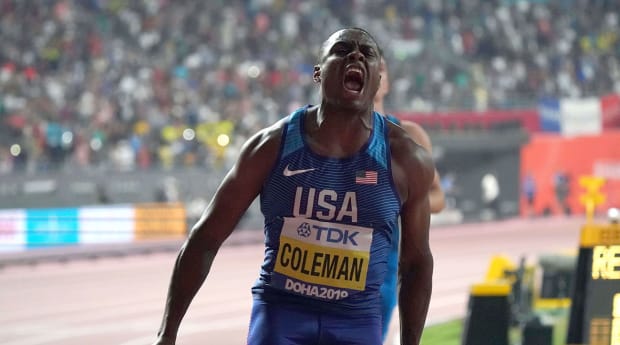Coleman has been banned from competition for two years after missing three anti-doping whereabouts failures in 12 months.

World champion Christian Coleman will miss next year's Tokyo Olympics after the Athletics Integrity Unit (track and field's independent anti-doping watchdog) determined that he recorded three whereabouts failures for anti-doping tests over a 12-month period. His suspension runs through May 13, 2022.
Coleman is the reigning world champion in the 100 meters and was a favorite to win gold at the Summer Games in Japan. Coleman has never tested positive for any banned substance.
Last year, Coleman's missed tests were revealed when the United States Anti-Doping agency charged Coleman with the three whereabouts failures but then dropped its case when one of the missed tests was not counted due to a technicality.
The Athletics Integrity Unit cited Coleman with missed a test on Jan. 16, 2019, recorded a filing failure for a test attempt on April 26, 2019 and missed a test on Dec. 9, 2019.
Coleman did not contest the first missed test but challenged the April and December strikes.
On April 26, 2019, Coleman's whereabouts stated that he would be training in Lexington, Ky., and would be home for his one-hour testing window from 7:30 p.m. to 8:30 p.m. Coleman was actually in Des Moines, Iowa, getting ready to compete at the Drake Relays. According to the AIU, a USADA doping control officer arrived at his home in Lexington at 12:09 p.m. because testing attempts can be made outside of the 60-minute window. Coleman informed him that he was in Iowa and reportedly updated his whereabouts after he was called. Coleman updated his whereabouts to a time slot that already passed. The AIU determined this would count as a filing failure against him.
For the test on Dec. 9, 2019, a doping control officer authorized by World Athletics (track and field's global governing body) arrived to conduct an out-of-competition test at Coleman's Lexington residence. His whereabouts information said that he would be home from 7:15 p.m. to 8:15 p.m. that day. The doping control officer and blood collection assistant were at his apartment at 7:15 p.m. and rang the doorbell every 10 minutes but no one answered.
Coleman was out Christmas shopping but argued that he was home before the end of his one-hour availability because he watched the start of that night's Monday Night Football Game at 8:15 p.m.
Shopping receipts showed that Coleman was shopping and bought Chipotle at 7:53 p.m. and then 16 items from Walmart at 8:22 p.m.
The AIU panel determined: "Although the Walmart Center is relatively close to the Athlete's residence, it would have been simply impossible for him to purchase a chipotle at 7:53 pm (the store being 5-9 minutes to his residence), drive home, park the car, go into his residence, eat the Chipotle, then watch the kick-off of the football game which only started at 8:15 pm, and thereafter go out to again in his car, drive to the store and pick up 16 items at the Walmart Supercenter so as to be able to pay for them by 8:22 pm."
Since Coleman did not go home until after his 8:22 p.m. purchase, he was hit with a missed test.
Coleman can still appeal his suspension to the Court of Arbitration for Sport.